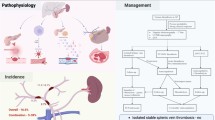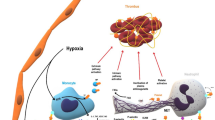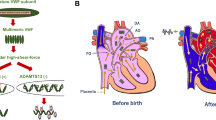Abstract
Antiphospholipid syndrome (APS) is classified as the association of a thrombotic event and/or obstetric morbidity in patients persistently positive for antiphospholipid antibodies and/or lupus anticoagulant. To evaluate the incidence of subsequent thrombosis among women diagnosed with purely obstetric APS. We retrospectively reviewed and collected demographic and clinical data from the computerized charts of all patients with obstetric APS, from 1992 to 2017. Eligibility criteria included all women diagnosed with APS, according to the 2006 revised criteria, for whom the clinical manifestations were purely obstetric. The primary endpoint was the occurrence of subsequent thromboembolic events, following diagnosis of obstetric APS. The study included 115 women diagnosed with obstetric APS. During the study’s follow up period, 12 (10.4%) women developed thrombosis. Of the 12 women who developed thrombosis, 9 (75%) of the thrombotic events were arterial. The site of arterial thrombosis was cerebral in all cases. Venous thrombosis occurred in 3 (25%) women, including one in each of the following sites—pulmonary embolism, ovarian vein thrombosis and proximal leg deep vein thrombosis. Our data suggests that women with obstetric APS are at risk for subsequent long-term thrombosis, especially arterial cerebral events. We did not identify any clinical or laboratory unique features among women with obstetric APS who will eventually develop thrombosis.
Similar content being viewed by others
Change history
31 August 2017
An erratum to this article has been published.
References
Ruiz-Irastorza G, Crowther M, Khamashta M (2010) Antiphospholipid syndrome. Lancet 376(9751):1498–1509
Schreiber K, Hunt BJ (2016) Pregnancy and antiphospholipid syndrome. Semin Thromb Hemost 42(7):780–788
Miyakis S, Lockshin MD, Atsumi T, Branch DW, Brey RL, Cervera R et al (2006) International consensus statement on an update of the classification criteria for definite antiphospholipid syndrome (APS). J Thromb Haemost 4(2):295–306
Simioni P (2012) Thrombosis risk in purely obstetric APS. Blood 119:2435–2436
Barbhaiya M, Erkan D (2011) Primary thrombosis prophylaxis in antiphospholipid antibody-positive patients: where do we stand? Curr Rheumatol Rep 13(1):59–69
Finazzi G, Brancaccio V, Moia M, Ciaverella N, Mazzucconi MG, Schinco PC et al (1996) Natural history and risk factors for thrombosis in 360 patients with antiphopholipid antibodies: a four-year prospective study from the Italian registry. Am J Med 100(5):530–536
Quenby S, Farquharson RG, Dawood F, Hughes AM, Topping J (2005) Recurrent miscarriage and long-term thrombosis risk: a case-control study. Hum Reprod 20(6):1729–1732
Gris JC, Bouvier S, Molinari N, Galanaud JP, Cochery-Nouvellon E, Mercier E et al (2012) Comparative incidence of a first thrombotic event in purely obstetric antiphospholipid syndrome with pregnancy loss: the NOH-APS observational study. Blood 119(11):2624–2632
Bates SM, Greer IA, Pabinger I, Sofaer S, Hirsh J (2008) Venous thromboembolism, thrombophilia, antithrombotic therapy, and pregnancy: American College of Chest Physicians Evidence-Based Clinical Practice Guidelines (8th Ed). Chest 133(6 suppl):844S–886S
Silver RM, Draper ML, Scott JR, Lyon JL, Reading J, Branch DW (1994) Clinical consequences of antiphospholipid antibodies: an historic cohort study. Obstet Gynecol 83:372–377
Erkan D, Merrill JT, Yazici Y, Sammaritano L, Buyon JP, Lockshin MD (2001) High thrombosis rate after fetal loss in antiphospholipid syndrome: effective prophylaxis with aspirin. Arthritis Rheum 44(6):1466–1467
Committee on Practice Bulletins—Obstetrics, American College of Obstetricians and Gynecologists (2012) Practice bulletin no. 132: antiphospholipid syndrome. Obstet Gynecol 120:1514
Empson M, Lassere M, Craig JC, Scott JR (2002) Recurrent pregnancy loss with antiphospholipid antibody: a systematic review of therapeutic trials. Obstet Gynecol 99:135
Derksen RH, Khamashta MA, Branch DW (2004) Management of the obstetric antiphospholipid syndrome. Arthritis Rheum 50:1028–1039
Urbanus RT, Siegerink B, Roest M, Rosendaal FR, de Groot PG, Algra A (2009) Antiphospholipid antibodies and risk of myocardial infarction and ischaemic stroke in young women in the RATIO study: a case control study. Lancet 8(11):998–1005
Alijotas-Reig J, Ferrer-Oliveras R, Ruffatti A, Tincani A, Lefkou E, Bertero MT et al, (EUROAPS Study Group Collaborators) (2015) The European Registry on Obstetric Antiphospholipid Syndrome (EUROAPS): a survey of 247 consecutive cases. Autoimmun Rev 14(5):387–395
Funding
No funding was received for this study.
Author information
Authors and Affiliations
Corresponding author
Ethics declarations
Conflict of interest
The authors declare no conflict of interest.
Ethical approval
All procedures performed in studies involving human participants were in accordance with the ethical standards of the institutional and/or national research committee and with the 1964 Helsinki declaration and its later amendments or comparable ethical standards.
Additional information
The original version of this article was revised: The author name should be Genady Drozdinsky instead of Genady Drozidnsky. This has been corrected in this version.
An erratum to this article is available at https://doi.org/10.1007/s11239-017-1538-5.
Rights and permissions
About this article
Cite this article
Drozdinsky, G., Hadar, E., Shmueli, A. et al. Obstetric antiphospholipid syndrome and long term arterial thrombosis risk. J Thromb Thrombolysis 44, 371–375 (2017). https://doi.org/10.1007/s11239-017-1526-9
Published:
Issue Date:
DOI: https://doi.org/10.1007/s11239-017-1526-9




